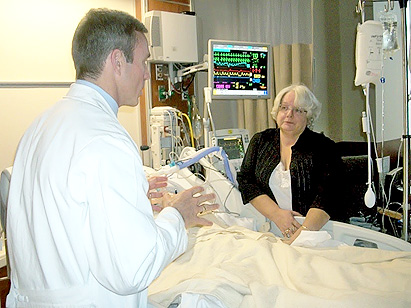Hi, it’s Patrik Hutzel from INTENSIVECAREHOTLINE.COM where we instantly improve the lives for Families of critically ill Patients in Intensive Care, so that you can make informed decisions, have PEACE OF MIND, real power, real control and so that you can influence decision making fast, even if you’re not a doctor or a nurse in Intensive Care!
This is another episode of “YOUR QUESTIONS ANSWERED” and in last week’s episode I answered another question from our readers and the question was
My Son is in ICU and Ventilated. Why Does the ICU Team Cannot Wean my Son Off the Ventilator?
You can check out last week’s question by clicking on the link here.
In this week’s episode of “YOUR QUESTIONS ANSWERED” I want to answer questions from one of my clients Lara, as part of my 1:1 consulting and advocacy service! Lara’s mother is critically ill in ICU with a hemorrhagic stroke, her condition improved but the ICU team continues with treatment limitations for her mom. Lara is asking on how to formally challenge the ICU team for their end-of-life decision for her mom?
My Mom is Critically Ill in ICU with a Brain Injury. How Can I Formally Challenge the ICU Team for their End-of-Life Decision for my Mom?

“You can also check out previous 1:1 consulting and advocacy sessions with me and Lara here.”
Lara: So do you think it’s worth me calling you and having you listen to the doctor from the side way?
Patrik: I can definitely do that for sure. The other thing that I do, if you want me to. Just by listening in, I could press the record button you don’t need to tell them.
Lara: That’s true actually. So if I did that, then would I be able to give you payment after? Is that okay?
Patrik: That should be fine. I can just listen in. That should be fine.
Lara: No, I can just pay right now actually.
Patrik: Okay. Sure.
Lara: I have to go now, but thank you so much.
Patrik: You’re very welcome.
Lara: Thank you so much and I’ll keep you updated.
Patrik: Okay. Thank you so much.
Lara: Thank you so much. Bye.
Patrik: Bye bye.
Lara: Thank you. Thank you.
RECOMMENDED:
Patrik: Intensive Care Hotline, Patrik speaking. How can I help?
Lara: Hello? Good afternoon, Patrik. This is Anne’s sister. You’ve been speaking with her in regards to my mother in hospital.
Patrik: Yes, that’s right.
Lara: That’s right. Thank you for helping us… Given us your number, and said you’re happy for us to give you a free call because we have a meeting with the consultant this afternoon.
Patrik: Yes, I can-
Lara: Thank you.
Patrik: … call you right back if you like. I can call you right back if you like so you don’t have to…
Lara: No, no, that’s fine. That’s fine Patrik.
Patrik: Okay, all right.
Lara: Basically, we’ve got a few questions, so is it a must that we attend the meeting with the doctors again. I mean, I know that they will be just negative with my mom’s condition.
Patrik: Right, okay. I know. When did they ask for this meeting? How long ago did they ask for this meeting? This comes as a surprise, does it?
RECOMMENDED:
Lara: Yeah, it was days back when we had our first talk with them, they said my mom had a hemorrhagic stroke and we were surprised about their plan of stopping my mom’s tube feeding just because the antibiotics seemed to be not taking effect. And now they are asking for a meeting and I have a feeling that they are into another negative agenda for my mom. That’s why I am hesitant in going into that.
Patrik: Okay. Yeah I understand. I Understand. Let me ask you this question. What do you think will happen if you don’t go to the meeting? What do you think will happen?
Lara: That I will not be able to know their plans for my mom and that my mom will not receive the appropriate treatments due to her.
Patrik: No. You see… and don’t get me wrong here. I have worked in intensive care for nearly 20 years. I say something a little bit confrontational here. Some games in life you don’t play in order to win. What do I mean by that? They’re asking you for a meeting, by you going there, they in essence say I want you to jump and you ask, “How high?”
Lara: That is what I also thought..
Patrik: Right. No, I mean if they ask you… Again, I’m being very… Probably want to stir some response, like if they asked you, “Would you jump off this bridge tomorrow?” You wouldn’t jump off the bridge, would you? And they asked you to come to a meeting, so what?
Lara: I just think that I can refuse going into that meeting knowing that they are opting for treatment limitations to my mom.
RECOMMENDED:
Patrik: That’s the first thing that I was saying. But if you do decide to go, and I’m not telling you not to go, but I really want to stir some thinking. I’m not telling that you shouldn’t go, but you should give this some thought. Please. No. They have a duty of care towards your mother and towards you as a family as well.
Lara: Yes, I firmly feel that way that they should render their duty of appropriate care and management for my mom.
Patrik: This is actually then the first former meeting, is that correct? Okay. Yeah. The first formal meeting being called by them, everything else has been informally at the bedside and it’s all been negative. Right. Okay. Now that’s good information. The reason this is good information is simply they’ve been framing this from the start and now they’re basically lined you up for a meeting and they’ve been talking negatively for the last week or however long, and now they lined you up for a meeting, they have planted some seeds already like in terms of potentially not giving the feeds. I understand there has been a DNR as well. Do you know what I mean by that?
Lara: Yes, Do Not Resuscitate.
Patrik: Yes. Right. Which I understand they’ve done without you or your sister’s input or let alone consent. Right. They’ve lined it all up so they can push their agenda. In those meetings, they know what to say, they know how to say it, they know when to say it, and they know what not to say.
Lara: Yes, they have the same agenda every time I am talking to them.
Patrik: I’ve been in those meetings over and over again, whether as a nurse in intensive care or whether most of the time over the phone with my clients. I’m really stirring a bit here, if you’re not going, you’re sending a clear message to them that you’re not prepared to continue with this negative talk.
Lara: Yes, I should do that.
Patrik: The reality is it’s there at the moment. You haven’t formerly challenged it from what I understand. You could use the meeting to formally challenge it, but not… You could go into the meeting formally challenge the DNR and formally challenge the not feeding part and then leave it there. Don’t even bother about what else they have to say. Make this meeting about you and not about them because they will make the meeting about them, about their agenda.
Lara: Yes, this is about my mom’s life and I will be asking them for their hospital policy regarding end-of-life decisions because I believe that our mom should be completely out of that.
Patrik: Yeah, correct. Correct. And leave it there, and leave it there. Get a response to that rather than listening… You’ve listened to the doom and gloom for the last week. You don’t need another meeting… Correct. You don’t need to listen to more negativity. You’ve had that for the last week.
Lara: Yes, and their negativity is not helping my mom at all in her recovery. My mom has a significant improvement over the past days and they cannot see that. DNR is not for my mom.
RECOMMENDED:
Patrik: Yeah. Make this about your agenda and leave it there. If they want to go anywhere else with their agenda, just walk out, just walk out. You’ve got to be brave and you’ve got to do what 99% of people are not prepared to do. What you need to do then next is you need to ask for… When it comes to literally life or death decisions that they want to make, your next step then is to ask for their policy around that decision making process.
Lara: Yes, I will ask them that.
Patrik: Absolutely. Absolutely. What do you need to do with the DNR is whenever it comes to a DNR, they need to make that decision around the policy. Again they’re life or their decisions. They can’t just make random decisions, they need to base those decisions on policies and you should be asking them for those policies.
Lara: Yes, that is very important, thank you for informing me all this.
Patrik: If you think you’re going nowhere with this, you then need to ask for the policy. And if you do ask for the policies, ask them with a deadline and say, “Look, I want those policies by five o’clock today,” or whatever time you give them. Are you following there?
RECOMMENDED:
Lara: Right. Yep. Yes.
Patrik: Yeah. I can tell you what’s most likely in that policy. Okay. The DNR policy will probably read something along the lines of that they at a bare minimum have to consult you on that decision, or potentially get consent from you. Most likely it says consult, not consent with the not feeding policy or, this is more about medical treatment decision policy. The first thing you could say even before you ask for the policy is, “Look, if you are not feeding my mother, this is basically euthanasia.”
Lara: Right, I should be making those statements.
Patrik: That’s the first thing you can say. But even so again, that decision-making process needs to follow a policy. They can’t just say, “Hang on a sec, we just decide randomly we’re not going to feed your mother if the antibiotics are not working.” Again, that decision making process needs to be around the policy. Again, this is like a life or death decision. They must follow a policy there, and there must be something in the hospital.
Lara: How do I receive their hospital policy regarding treatment limitations?
Patrik: That’s a good question. Well, in this day and age, it could be in an email. I’ve had both. Some clients get an email, sometimes it could be in paper form, but in this day and age, yes, absolutely, they could email you the policy and you’ll have it on your mobile phone most likely.
Lara: Yes, they should be providing me that. But what could their DNR policy states? And would it be possible that we can let them remove the DNR status for the reason that they have not consulted us for that?
Patrik: Yeah. That’s a good question. Let’s start with the DNR. Okay, With the DNR, as I said to you 99% I’m certain the DNR policy will say something like, they have to consult you on that decision. Given that they haven’t consulted you, they’ve breached the policy, so then you can go back to them and say, “Hang on a sec, you’ve breached that policy and until you’ve consulted us on the decision, we want that DNR removed.
Lara: But I remember there was a time that they said that my mom is not going to improve and that they are slowly stopping some of her treatments. Can I consider that as consulting us for that decision of limiting treatments?
RECOMMENDED:
Patrik: No. It means that they sit down with you and number one explains to you what it exactly means, and number two, get your thoughts on it. I believe at this point in time that hasn’t happened.
Lara: So it hasn’t happened until this time, we were just surprised that they’ve come up with the end-of-life decision for her and we are clearly against that especially seeing our mom’s condition is improving.
Patrik: Yeah, exactly. You haven’t had any input on what would your mother want. They haven’t asked you about that as far as I understand. Right. And again, when it comes to stopping the feeding, there must be a policy around that decision making process, because at the end of the day not feeding or starving a patient could ultimately lead to number one, could harm your mother. And number two, it could kill your mother. Again, that decision needs to be around a policy and that could be an end of life decision making policy. I am not 100% sure where it fits in. But again, I would probably refer to an end of life care decision making policy.
Lara: Right, they are slowly taking my mom’s life into their own hands and I should stop them from doing that.
Patrik: The next thing you could do if you feel like… I can tell you what will most likely happen to begin with. There will be probably a lot of resistance from their end, okay. But that doesn’t mean you should be giving up. It just means you need to try again. Like with anything in life, if you don’t succeed at the first attempt, you need to try again. They’re not used to getting with this… They’re not used to it. The other thing you could do, is you could ask for the medical records, but I would keep that as a next step. You could ask for the medical records because you might find things in the medical records that… There may be stuff documented that they haven’t told you about that could potentially impact on your mother’s care. They might have excluded other treatment options because they think it’s “not in her best interest” and you might not be aware of any that communication unless you’ve seen the notes.
Lara: Yes, I think I can ask for her medical records.
Patrik: Where is your mother? Have you seen your mother today?
Lara: No, I have not seen her today.
Patrik: You haven’t? The reason I’m asking is my understanding is from your sister that she’s been gradually improving.
Lara: Yeah. Absolutely.
Patrik: With that slow but steady improvement from what I understand, another line of argument would look, she’s slowly but steadily improving, from that perspective she needs to come in a position where she can be asked by the doctors, “Hey, do you want us to stop feeding? Do you want us to issue a DNR?” That’s another line of argument. They’re making decisions without giving her the time to get to a point where she can make her own decision.
RECOMMENDED:
Lara: Yes and for them, my mom is not improving at all.
Patrik: Yep. Yeah. I can tell you what you should be saying to that. She’s not improving in a timeline that’s convenient for them, or in a time frame. She’s not improving in a timeframe that’s convenient for them. Right. Because the worst case scenario for an ICU is that they’re looking after a patient indefinitely with an uncertain outcome. That’s the worst case scenarios in ICU. They’re counting the dollars, they’re counting the beds, they’re counting the staff. She’s not improving fast enough for their budget, let’s face it.
Lara: But they should be treating all patients fairly.
Patrik: Absolutely.
Lara: Is this really the type of how the ICU team operates that is why they are always being negative and do intently push the relatives to resort to the withdrawal of treatment for their critically ill loved ones?
Patrik: They do, but they would never say them with you. Yes, of course they do. They do, but they would never share them with you. It’s also dependent on almost day to day hospital activity. If for whatever reason the hospital would be dead quiet at the moment, she would probably get a little bit more time. But somebody is counting the dollars or the pounds and the beds in the background. Somebody might also say, “Oh look, if she was to leave ICU alive, she would have to go onto rehab.” Again somebody might do the math in the background. Terrible. They’re making the decisions not only from an ICU perspective, also what they think might happen long term. I don’t know. I don’t want to go off track here, but did you follow James Middleton’s case a couple of months ago? Yeah. 50% of that sort of situation was that the government wasn’t prepared to pay for long-term care, which is what James would have needed.
RECOMMENDED:
Lara: Alright.
Patrik: That was 50% of this whole situation. They thought, yeah James would probably survive ICU and then he goes home and we’ll pay for the rest of his life. Terrible. Absolutely. It’s shocking what’s happening there. I can say that with confidence because we work with the family. I know way more than was portrayed in the media, and it’s just shocking. There’s no value for life.
Lara: Alright, so if the ICU team is really persistent in pursuing the DNR status of my mom, do I have any other options or steps to take to get rid of that?
Patrik: Yep. Yeah. Oh yes. Yeah, absolutely. The next step then would be to go to a hospital executive level, but it’s probably too early. You need to gauge… You probably need to gauge… Yes. And look, I’m always for working with people. You may be surprised. Maybe it’s more positive than you think it is. I doubt it by what you’ve shared and what your sister shared, but you never know. You never know.
Lara: Ok.
Patrik: Prepare for the worst. Keep an open mind. Maybe it’s not as bad as you think it is. Maybe also in the meantime a lot of it will also depend on what your mom will be doing in the meantime. A lot of things you can’t control, but there is a lot you can control if you are prepared to open your mind towards new ideas and go against the grain. Go against the grain, and don’t be afraid to do so. Yep. Exactly. Take it from there. But also be prepared that if you think the meeting is not going in a direction that you think it should be going, be prepared to walk out. Be prepared to stop them and say, “Look, we’re not even going there, and please stop. We’ll just go and…” Make clear what you want, and be persistent there. Don’t take no for an answer.
Lara: Yes, I’ll do that. I need to prepare and take note of all the things you’ve mentioned to me to ask them.
Patrik: Yeah. Do you want me… and I should have said that in the beginning. I have recorded this call. Do you want me to send you the recording of the call?
Lara: Yes please so I can review it and be equipped of the right questions to ask the doctors.
Patrik: Yes. Because then you can if you want to listen to it… I don’t know how much time you have.
RECOMMENDED:
Lara: I will listen to it as soon as you send it to me. Thank you for all your help Patrik. We really appreciate it.
Patrik: You’re very welcome. You’re very welcome. All the best. Thank you.
Lara: Bye-bye.
Patrik: Bye, bye.
The 1:1 consulting session will continue in next week’s episode.
How can you become the best advocate for your critically ill loved one, make informed decisions, get peace of mind, control, power and influence quickly, whilst your loved one is critically ill in Intensive Care?
You get to that all important feeling of making informed decisions, get PEACE OF MIND, CONTROL, POWER AND INFLUENCE when you download your FREE “INSTANT IMPACT” report NOW by entering your email below!
In Your FREE “INSTANT IMPACT” report you’ll learn quickly how to make informed decisions, get PEACE OF MIND, real power and real control and how you can influence decision making fast, whilst your loved one is critically ill in Intensive Care! Your FREE “INSTANT IMPACT” Report gives you in-depth insight that you must know whilst your loved one is critically ill or is even dying in Intensive Care!
Sign up and download your FREE “INSTANT IMPACT” REPORT now by entering your email below! In your FREE “INSTANT IMPACT” REPORT you’ll learn how to speak the “secret” Intensive Care language so that the doctors and the nurses know straight away that you are an insider and that you know and understand what’s really happening in Intensive Care! In your FREE report you’ll also discover
- How to ask the doctors and the nurses the right questions
- Discover the many competing interests in Intensive Care and how your critically ill loved one’s treatment may depend on those competing interests
- How to eliminate fear, frustration, stress, struggle and vulnerability even if your loved one is dying
- 5 mind blowing tips & strategies helping you to get on the right path to making informed decisions, get PEACE OF MIND, control, power and influence in your situation
- You’ll get real world examples that you can easily adapt to you and your critically ill loved one’s situation
- How to stop being intimidated by the Intensive Care team and how you will be seen as equals
- You’ll get crucial ‘behind the scenes’ insight so that you know and understand what is really happening in Intensive Care
- How you need to manage doctors and nurses in Intensive Care (it’s not what you think)
Thank you for tuning into this week’s YOUR QUESTIONS ANSWERED episode and I’ll see you again in another update next week!
Make sure you also check out our “blog” section for more tips and strategies or send me an email to [email protected] with your questions!
Also, have a look at our membership site INTENSIVECARESUPPORT.ORG for families of critically ill Patients in Intensive Care here.
Or you can call us! Find phone numbers on our contact tab.
Also check out our Ebook section where you get more Ebooks, Videos and Audio recordings and where you can also get 1:1 counselling/consulting with me via Skype, over the phone or via email by clicking on the products tab!
This is Patrik Hutzel from INTENSIVECAREHOTLINE.COM and I’ll see you again next week with another update!







